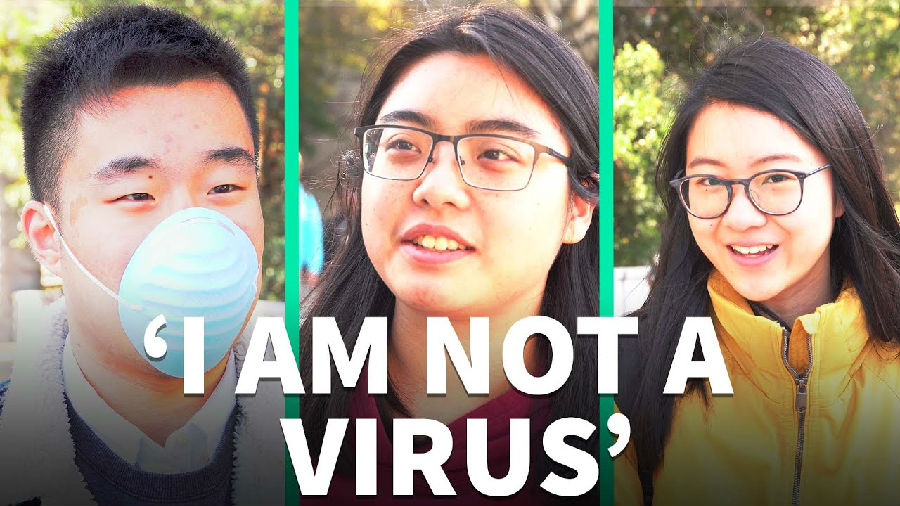Don't let fear prevent kindness
可怕的是病毒,不是中國人
The sudden rise of the new coronavirus has shocked China. Although China has been doing everything possible to stop the virus, it has spread outside of its borders and into other regions. There are now confirmed cases of COVID-19 in countries including the UK, Japan, Germany, Vietnam, Russia and the United States.
新型冠狀病毒疫情的突然爆發震驚全國。盡管我國采取了一切可能的防疫措施,但病毒還是傳播到了國外,進入其他地區。如今,英國、日本、德國、越南、俄羅斯以及美國都發現了新型冠狀病毒肺炎的確診病例。
There is a growing fear that the effects of the outbreak will worsen if it is not contained. This has led to countries closing borders with China and putting travel bans in place, hoping to protect their own citizens. However, fear and misinformation have also caused the spread of something else – racism.
人們越來越擔心,如果不加以控制,疫情會變得更糟。這令一些國家關閉了與中國的邊境,并發布實施旅行禁令,以此來保護本國公民。但恐懼與不實消息也助長了其他東西的傳播 —— 種族歧視。
Restaurants and businesses in many tourist areas across the world have posted signs banning Chinese people. Social media users recently shared a picture of a sign outside a hotel in Rome, Italy. The sign said that "all people coming from China" were "not allowed" in the hotel. Similar signs with anti-Chinese sentiment were also reportedly seen in South Korea, the UK, Malaysia and Canada. These signs were loud and clear – "No Chinese".
全球許多旅游景區的餐廳和商鋪都張貼了禁止中國人入內的告示。最近,有社交媒體用戶分享了意大利羅馬一家酒店外的告示照片。上面寫著“所有來自中國的旅客”“不得進入”酒店。據報道,類似帶有反華情緒的告示在韓國、英國、馬來西亞、加拿大等地都有出現。這些告示都寫得清清楚楚 —— “中國人勿進”。

Racist actions such as these do a lot more harm than good.
諸如此類的種族主義行為弊大于利。
"My ethnicity has made me feel like I was part of a threatening and diseased mass," Sam Phan, a master's student at the University of Manchester, wrote to the Guardian.
“我的種族讓我感到自己是危險的患病群體的一份子,”曼徹斯特大學研究生薩姆·潘在《衛報》上寫道。
Edith Bracho-Sanchez, an assistant professor at Columbia University Irving Medical Center, has experience working on health issues that involve international borders. "As human beings, we are afraid of things we don't know, but our response should be to educate ourselves, not to further spread ... fears and misunderstandings," she said. Bracho-Sanchez suggested that the media should "stick to the facts".
哥倫比亞大學歐文醫學中心助理教授伊迪絲·布蘭科-桑切斯曾對涉及國際邊境的衛生問題有所研究。“作為人類,我們會害怕未知的事物,但我們的反應理應是自我教育,而不是進一步傳播……恐懼與誤解,”她說道。布蘭科-桑切斯建議媒體應當“忠于事實”。
Phan shared a similar view: "It's important ... to see us in all our diversity, as individual human beings, and to challenge stereotypes. The coronavirus is a human tragedy, so let's not allow fear to breed hatred, intolerance and racism."
潘也有著類似的看法:“作為個人,看到我們的多樣性并挑戰刻板印象十分重要。這場冠狀病毒疫情是全人類的悲劇,因此,不要讓恐懼引發種族仇恨、偏狹與種族主義。”
Instead of spreading misinformation and fueling fearful thoughts, we should do everything we can to support those who are affected by events such as the COVID-19 outbreak. After all, the real enemy is the virus, not the people who are fighting it.
我們不應傳播謠言,滋長恐懼情緒,而是應當做力所能及的一切來支持受到新型冠狀病毒肺炎疫情等事件所影響的人們。畢竟,大家真正的敵人是病毒,而非與之對抗的人。












